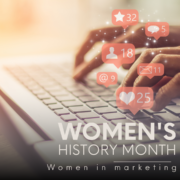AI in B2B Marketing
Partnering with an AI-aware marketing agency is key
As the advancements in artificial intelligence (AI) continue to shape the business landscape, it’s crucial for B2B marketers to understand the potential benefits and challenges of integrating AI into their marketing efforts. While AI offers valuable tools and automation, it’s important to approach its implementation cautiously and ensure that you have proper training, protocol, and processes for employees – especially as an agency servicing clients. Businesses hiring agencies should also understand the significance of partnering with vendors aware of the nuances of AI and inquire about these points before making any final decision.
- Define Your Objectives: As with any tool, it’s vital to clearly define your marketing objectives first and then identify the areas where AI can assist. Whether it’s lead generation, content personalization, or customer segmentation, having a well-defined purpose will help you assess the relevance and effectiveness of AI solutions.
- Understand the Limitations: While AI can bring efficiency and automation, it’s essential to recognize its limitations. AI algorithms depend on data, and biases can inadvertently influence outcomes. Further, its style – when copied directly vs nuanced with the human eye and mind – can be off-brand. Understand the potential pitfalls and ensure that ethical considerations are taken into account during the implementation process and that employees have clear directives on how to work with AI to avoid embarrassing mistakes.
- Choose the Right AI Tools: Evaluate and select AI tools that align with your marketing goals. Consider factors such as scalability, compatibility with existing systems, ease of use, and the ability to provide actionable insights. Collaborate with your IT department or seek expert advice to make informed decisions.
- Data Quality and Privacy: Data is the fuel that drives AI algorithms. Ensure that your data is accurate, up-to-date, and of high quality. Implement robust data governance practices and prioritize customer privacy and data protection. Ensure that your employees or agency aren’t sharing corporate secrets with tools that may not comply. Compliance with relevant regulations, such as GDPR or CCPA, is crucial for maintaining trust with your B2B customers.
- Partnering with an AI-Aware Agency: Let’s be honest, we are all figuring this out together as AI has just become mainstream. That being said, when seeking external assistance, work with a B2B marketing agency that understands the nuances of AI and has been testing its applicability in marketing. Look for agencies with expertise in AI-driven marketing strategies and a track record of successful implementations. They should have a deep understanding of your industry and be able to integrate AI technologies effectively while preserving the human touch.
- Collaboration and Training: Collaborate closely with your chosen agency throughout the AI integration process. Communicate your specific requirements and ensure that the agency understands your unique business context. Additionally, invest in training your internal team to leverage AI tools effectively and adapt to the changing dynamics of AI-driven marketing. Ensure that your agency has done the same. Typical agency structure means that, often, junior-level executives are creating content. Confirm with your agency that AI training is in place, inquire about what it looks like, and ask about approvals protocol for all content. Finally, be sure that employees understand that garbage in equals garbage out. AI often produces a recap of the information put in, vs. fact-based value-add.
- Continuous Evaluation and Adaptation: Implementing AI in B2B marketing is iterative. Continuously monitor and evaluate the outcomes, making adjustments as needed. Regularly assess the performance of AI algorithms, fine-tune models, and stay updated with the latest AI advancements to optimize your marketing strategies.
AI has the potential to revolutionize B2B marketing by enhancing efficiency, personalization, competitive analysis, and customer insights. However, a cautious approach is necessary to avoid pitfalls and maintain the essential human connection in your marketing efforts. By defining clear objectives, selecting the right tools, prioritizing data quality and privacy, and partnering with an AI-aware agency, you can harness the power of AI while ensuring a balance between automation and human interaction. Remember, AI is a supplement to human efforts, not a complete replacement.



